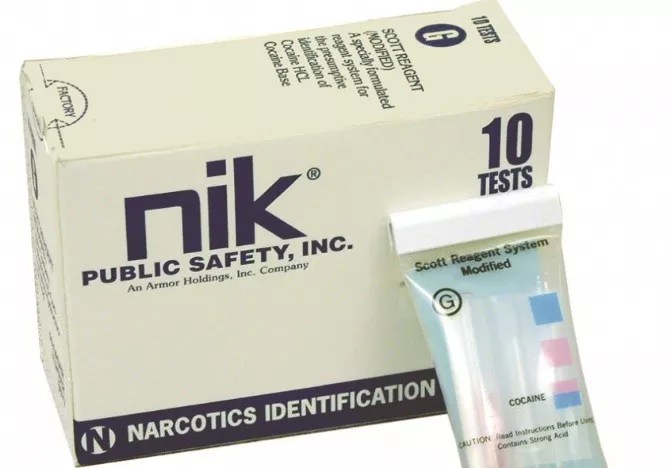
YouTube file photo

Audio By Carbonatix
In May, as we’ve reported, Michael McCarron was arrested on a methamphetamine charge, even though he’s never knowingly possessed the substance, because a small amount of marijuana in his possession registered positive for meth according to two field-test kits known as NIKs. Now, an examination at a lab shows that the cannabis wasn’t laced with meth after all.
While the case against McCarron was dropped in the wake of these results, he remains upset about the series of events, which led to him losing his job, as well as law enforcement’s apparent faith in NIK tests despite plenty of evidence that they’re extremely unreliable.
“These test kits seem to be complete bullshit,” McCarron says. “Which is unfortunate, because this whole thing cost me a lot of money and time.”
Here’s how McCarron described the bizarre May 18 incident to us for our initial post.
“I worked as a delivery driver for the Gulley Greenhouse in Fort Collins,” he said. “They deliver flowers and stuff to military bases, and I was delivering some flowers to Peterson Air Force Base in Colorado Springs.”
McCarron had a small amount of marijuana and a one-hitter zipped in the pocket of his jacket upon his arrival at the base a little shy of 9 a.m. on the 18th, but he didn’t think it would be a problem. After all, he hadn’t been smoking (he was saving the weed for after work), and he’d had the same pipe and a similar amount of cannabis in his possession during a stop at the base the previous week, and there’d been no problem.
This time, though, things were different. Following a tough commute (a late spring snowstorm battered the area that day), McCarron joined other drivers in what he characterized as “a secure waiting room” while security inspected their vehicles. Then, after the other drivers were allowed to return to their rides, he noted, “a female sentry told me I had to stay, and I was asked by Air Force security to enter the search area. They asked me to face the wall, and I was handcuffed by another sentry from behind.”

Peterson Air Force Base.
Photo by Michael Kaplan via peterson.af.mil
Why? That’s what McCarron wanted to know. “I asked, ‘What’s going on?'” he recalled. “They told me it wasn’t in their jurisdiction to answer any questions.”
Next, McCarron was searched and given a Horizontal Gaze Nystagmus (HGN) test, a standard sobriety analysis that involves observing a subject’s eyes when he looks sideways at an angle of 45 degrees. McCarron, who’d worked fifteen hours the day before and admitted that he was a bit “disheveled,” supposedly failed the test, which he chalked up to being confused and “distracted by people asking me how much marijuana I’d smoked.”
Shortly thereafter, McCarron said, “security guards paraded me handcuffed in front of everybody in line waiting to get on the base and sat me in a chair at a window for over an hour” before the arrival of the Colorado Springs Police Department, who took charge of the case from military authorities at that point. A CSPD officer subsequently administered the same HGN test, and this time, McCarron passed, which explains why he evaded a charge of driving under the influence. But he wasn’t released. Instead, amid his requests to speak with a lawyer, he was questioned about whether or not he had a medical marijuana card (he doesn’t), and his truck was searched by the civilian cops. He also heard a Springs officer and a member of the military discussing what his marijuana was “laced with,” he recalls. “And I blurted out, ‘The marijuana isn’t laced with anything.'”
Nonetheless, he was placed under arrest, and he learned the reason when he got a glimpse of the computer screen inside the squad car transporting him to El Paso County jail: “It said the subject was being retained for methamphetamines. And I said, ‘I wouldn’t know what methamphetamines looked like or smelled like. I’ve never done anything like that in my life.’ And [the officer] said, ‘You’re learning a hard lesson. You need to know where your marijuana comes from if it didn’t come from a dispensary.'”
The cannabis came from a private grower he trusts, McCarron maintained, and he’d been using it for several weeks with no indication that it was anything other than marijuana. But law enforcement documents said his pot had been given a NIK test – the letters stand for “Narcotics Identification Kit” – by Peterson personnel and the Springs cops, and it scored positive for meth in both instances.
These results don’t constitute proof. Indeed, NIK tests, which are used in the field as the equivalent of portable breath tests for alcohol, aren’t admissible in court, said Daniel Kay, a Colorado Springs-based attorney who represented McCarron. “They’re not overly reliable,” he told us for our previous report. “There are all kinds of reports about false positives. I don’t have a lot of faith in them.”

A NIK test.
alternateforce.net
He definitely won’t now. An analysis by the Colorado Springs Metro Crime Laboratory showed that the marijuana in McCarron’s possession had no sign of meth, period.
This finding means McCarron is off the hook from a legal perspective. But it’s hardly a no-harm, no-foul situation. “I lost my job, and I lost some respect among my friends in the community,” he points out. “And I had to hire an attorney, which cost me $4,000 or $5,000 right there – and it would have cost even more if they’d brought it to trial, which they were going to do. I don’t know how they could pursue something as aggressively as they did based on no evidence” other than the NIK tests.
When we chatted with lawyer Kay earlier this year, he expressed doubts that bogus claims of meth in marijuana had become a new law enforcement tactic. But McCarron still has his suspicions. “That’s part of the way DAs work – they trump up the charges and then try to cut a deal with you. If I hadn’t been on the ball and gotten an attorney right away, I could have been railroaded. And there was all kinds of false information in the police reports. The first one showed there was 13 grams of marijuana” – because the Colorado Springs Police Department included the weight of the container and the one-hitter. “Then it went down to 3.5 grams. And when the lab got it, there were only 1.65 grams, which is what I originally said. If my total had been that far off, it would have been a crime. But if law enforcement does it, there’s no problem.”
Next on McCarron’s agenda is to get the felony arrest off his record; despite the fact that the case was dismissed, references to his bust linger and could hurt his future employment opportunities.
“It’s a crazy world when you hear about marijuana magically turning into methamphetamine right before your eyes,” he jokes. Then he turns serious, saying, “You’d think common sense would have taken over and the officer would’ve dumped it on the ground and sent me on my way rather than trying to literally make a federal case out of something that’s legal.”